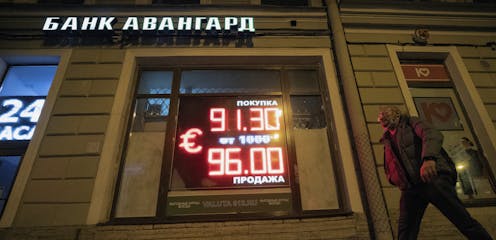Are Russia's elite really using cryptocurrency to evade sanctions?
- Written by Dr Paul Mazzola, Lecturer Banking and Finance, Faculty of Business and Law, University of Wollongong

Fearing Russia’s elite will evade economic sanctions by converting their wealth to cryptocurrency, high-profile US Democratic senator Elizabeth Warren has introduced a bill into US Congress to stymie Russian crypto transactions.
Warren warned a Senate committee hearing:
So no one can argue that Russia can evade all sanctions by moving all its assets into crypto. But for Putin’s oligarchs who are trying to hide, you know, a billion or two of their wealth, crypto looks like a pretty good option.
The bill does not seek to impose a blanket ban on all Russian cryptocurrency transactions. But it would give the US government the authority to ban US companies from processing cryptocurrency transactions connected to sanctioned Russian accounts, and to apply secondary sanctions to foreign cryptocurrency exchanges doing business with sanctioned Russian individuals, companies or government agencies.
But is it even necessary?
Even though the evidence shows that Russian cryptocurrency transactions have been increasing in both number and value in the past month, the scale suggests buyers are ordinary Russians seeking to hold on to their savings as the value of the ruble crashes.
Targeting sanctions
The economic sanctions imposed on Russia for invading Ukraine are naturally hurting the entire Russian economy. Their intended target, though, is to hit Putin and the billionaire oligarchs who support his rule where it hurts most.
A cornerstone of this strategy is stopping these individuals from using or moving their wealth around by freezing the assets they hold overseas and blocking financial transactions.
But the continued operation of cryptocurrency exchanges in Russia, such as Binance, Yobit and Local Bitcoins, has been worrying US officials for some time. Even before Russia’s latest invasion of Ukraine, the US Treasury Department warned cryptocurrencies could undermine the sanctions already imposed on Russia over its 2014 annexation of Crimea.
Ruble’s falling value
Our first graph below shows why ordinary Russians have good reason to buy cryptocurrency.
Since the February 24 invasion of Ukraine, the ruble’s value against the US dollar has fallen by as much as 40%, from $US1 being worth 76 rubles to 132 rubles. At the time of publication, $US1 was worth about 109 rubles.
The ruble falls off a cliff
More rubles going into Bitcoin
The next graph shows the value of Bitcoin transactions by Russian accounts in rubles.
Bitcoin is not the only cryptocurrency Russians could buy, but it is by far the most traded and trusted of all cryptocurrency offerings, so is a useful proxy for the market. This data comes from Coin Dance, a leading Bitcoin statistics and services company.
Since the war began on February 24 until time of publication, spending on Bitcoin using rubles has increased by 260%.
Bitcoin trading volumes by Russian accounts in rubles (weekly)
Source https://theconversation.com/are-russias-elite-really-using-cryptocurrency-to-evade-sanctions-179559

